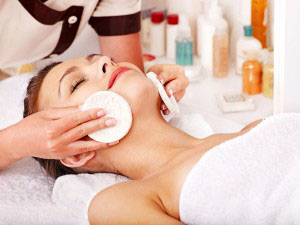 Although a procedure called a “chemical peel” may sound harsh and even risky, the so-called chemicals used to rejuvenate damaged skin are actually gentle, moisturizing exfoliation solutions that safely remove dead skin cells to reveal fresh, healthy skin. Chemical peels are performed by professional dermatologists at Mayoral Dermatology for the purpose of reducing the appearance of fine lines, acne scars, age spots, other types of mild scarring and discolorations frequently caused by pregnancy and long-term use of birth control pills. Even if you don’t suffer from specific skin damage, a chemical peel will dramatically improve the overall health of your skin by deep cleaning and exfoliating accumulations of skin debris resulting from aging, sun exposure and common air pollutants.
Although a procedure called a “chemical peel” may sound harsh and even risky, the so-called chemicals used to rejuvenate damaged skin are actually gentle, moisturizing exfoliation solutions that safely remove dead skin cells to reveal fresh, healthy skin. Chemical peels are performed by professional dermatologists at Mayoral Dermatology for the purpose of reducing the appearance of fine lines, acne scars, age spots, other types of mild scarring and discolorations frequently caused by pregnancy and long-term use of birth control pills. Even if you don’t suffer from specific skin damage, a chemical peel will dramatically improve the overall health of your skin by deep cleaning and exfoliating accumulations of skin debris resulting from aging, sun exposure and common air pollutants.
How a Chemical Peel Works
By applying acids that are conducive to skin rejuvenation such as lactic, glycolic, carbolic or salicylic acid, dermatologists are able to minimally “injure” targeted skin layers which encourages the skin to begin healing itself. This creates the formation of new skin cells that improves the texture and color of skin that previously suffered from superficial damage. In addition, exfoliation of the skin stimulates collagen production and rapid growth of the epidermis in order to distribute melanin more evenly. Melanin re-distribution is important for skin that is suffering from discoloration due to hormone fluctuations and sun exposure.
Light (Superficial) Chemical Peels
Light chemical peels are great for improving skin tone, fine lines, acne outbreaks, dry skin and uneven pigmentation. Regeneration of the epidermis is visibly noticeable within three to four days of having the procedure done due to elimination of dead skin cells and an increase in collagen production. Chemicals used in a light chemical peel include beta and alpha hydroxy acids along with a cleansing solution that is applied prior to beginning the actual peel. Treatments can be safely repeated once per week for up to five or six weeks in order to obtain the results you want.
Another popular light (or medium) chemical peel solution is called “Jessner’s Peel” and consists of salicylic acid, lactic acid and resorcinol, an anti-bacterial exfoliative that also treats fungal infections. Mainly used to treat sundamage and hyperpigmentation, Jessner’s Peel is applicable for all types of skin and is beneficial for patients who suffer from acne. The integration of resorcinol in Jessner’s Peel helps to unclog follicles, decrease production of sebum and promote healing of acne outbreaks.
Medium Chemical Peel
For acne pitting, more severe discolorations and wrinkles that are more than just fine lines, a medium chemical peel may be effective than a light peel. A chemical called trichloroacetic acid combined with glycolic acid is generally used to remove dead skin cells from the epidermis and the dermis, which is the layer of skin just below the epidermis.
Deep Chemical Peel
Pretreatment with Retin A or other prescription topical medication that thin the epidermis to allow penetration of the chemical more deeply and evenly is required prior to receiving a deep chemical peel. You will need to apply this pre-treatment ointment several weeks before getting a deep chemical peel to optimize results. A strong chemical called Phenol is used which produces dramatic results if you suffer from dark blotching related to aging or sun exposure. In addition, the effects of a Phenol skin peel lasts longer than light or medium peels, sometimes for more than a decade.
Avoid Sunlight Following a Chemical Peel
With all levels of chemical peels, patients will need to keep skin out of sunlight. After healing has significantly progressed, you are still required to protect skin from UV rays by wearing sunscreen and limiting time spent in the sun. The new skin growth occurring as dead skin cells are shed and collagen production increases is vulnerable to being discolored or damaged from sunlight.
Word of Caution
Although “at-home” chemical peels are available over the counter at pharmacies, they are very mild and do not produce the significant results that a clinically performed chemical peel can give you. Additionally, leaving one of these home chemical peels on your face for even a few seconds too long may cause allergic reactions or skin irritations severe enough to seek medical attention. Instead of playing “Russian roulette” with your skin, enjoy the personal and professional attention you receive at Mayoral Dermatology when you want to improve the appearance of your skin with a safe and effective chemical peel.

